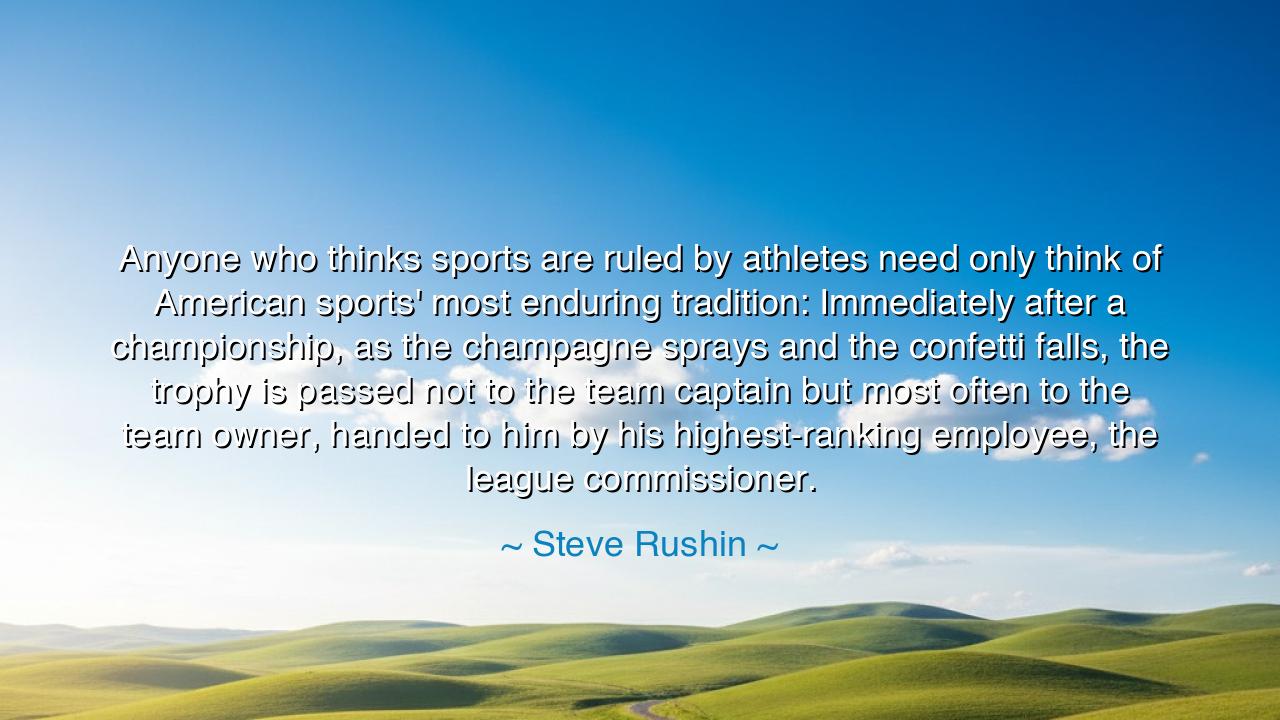
Anyone who thinks sports are ruled by athletes need only think
Anyone who thinks sports are ruled by athletes need only think of American sports' most enduring tradition: Immediately after a championship, as the champagne sprays and the confetti falls, the trophy is passed not to the team captain but most often to the team owner, handed to him by his highest-ranking employee, the league commissioner.






The words of Steve Rushin strike with the clarity of a bell tolling in the night: “Anyone who thinks sports are ruled by athletes need only think of American sports' most enduring tradition: Immediately after a championship, as the champagne sprays and the confetti falls, the trophy is passed not to the team captain but most often to the team owner, handed to him by his highest-ranking employee, the league commissioner.” In this moment of glory, when sweat and sacrifice should be honored, the truth is revealed: power in sports is not held by the athletes who shed their blood on the field, but by those who command from the shadows of wealth and authority.
The meaning of this statement is not merely about a trophy, but about the deeper structure of power. Athletes may inspire the world with their courage, their artistry, their discipline. They may risk their bodies and sometimes their lives in pursuit of victory. Yet when the hour of triumph arrives, the first hands upon the prize are not theirs. The ritual itself speaks: the true rulers of the game are not those who play, but those who own, those who hold the purse, those who dictate the laws from offices far from the roar of the crowd.
The origin of this observation comes from the very heart of modern sport, especially in America, where leagues are corporations, players are employees, and games are businesses as much as contests. Steve Rushin, as a chronicler of the games, noticed that the most sacred moment of celebration — the awarding of the championship trophy — is given first to the owner. This act, repeated across decades, has become the silent testimony of who holds the highest power. It is tradition, yes, but it is also revelation: the spectacle is built on the sweat of the many, yet crowned by the hands of the few.
History offers many mirrors to this truth. In the ancient arenas of Rome, gladiators fought and died for the entertainment of the people, yet the glory of the spectacle always flowed upward — to the emperor, to the patricians, to the ruling class who presided over the games. The men who bled were celebrated for a moment, but it was the rulers whose names endured in the marble of history. So too in our age: the athlete’s name may shine for a season, but the power structure belongs to those who command from beyond the arena.
And yet, within this harsh truth lies a call to awareness. The athlete, though subject to the structures of ownership, still wields a different kind of power: the power of inspiration, the power to move hearts, the power to spark change. When Muhammad Ali spoke against war, his words thundered beyond the ring. When Jackie Robinson stepped onto the diamond, he carried more than a bat; he carried the hopes of millions. The owners may lift the trophy first, but it is the athletes who ignite the soul of the people.
The lesson is this: know who holds power, but also know where true greatness lies. Wealth and authority may command the rituals, but it is courage, discipline, and sacrifice that inspire generations. Do not be deceived by ceremonies that glorify the powerful; look instead to the ones whose sweat made the moment possible. In life, as in sport, the rulers may take the first bow, but it is the unseen laborers, the fighters, the dreamers, who carry the true weight of victory.
So let us pass this teaching forward: when the confetti falls and the champagne sprays, do not forget whose hands earned the right to lift the prize. Remember that behind every crown lies the toil of those who may never touch it first. And in our own lives, let us not measure greatness by who receives recognition, but by who gives of themselves, wholly and without reserve. For though power may hold the trophy, it is sacrifice that makes it shine. And in that sacrifice lies the eternal glory of the athlete.






AAdministratorAdministrator
Welcome, honored guests. Please leave a comment, we will respond soon